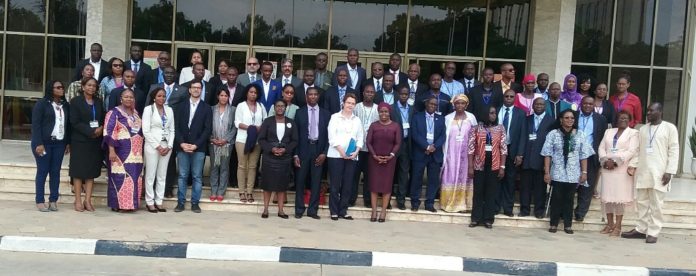 ABUJA (Web Content Management Team Report) – A two days meeting of the Technical Experts from the West African Epidemiology Network on Drug Use (WENDU) is holding at the ECOWAS Parliament in Abuja to discuss the impact of illicit drug use, supply and dependence and their effects on public health as well as developmental and security problems in West Africa. The meeting aims to also deliberate on the dangers which accompany the use of illicit drugs such as criminal behaviours, poverty, violence, social and health problems.
ABUJA (Web Content Management Team Report) – A two days meeting of the Technical Experts from the West African Epidemiology Network on Drug Use (WENDU) is holding at the ECOWAS Parliament in Abuja to discuss the impact of illicit drug use, supply and dependence and their effects on public health as well as developmental and security problems in West Africa. The meeting aims to also deliberate on the dangers which accompany the use of illicit drugs such as criminal behaviours, poverty, violence, social and health problems.
Speaking at the opening ceremony which held on Wednesday 13th July 2016, the UNODC Representative in Nigeria, Christina Albertina on behalf of the UNODC Representative for West Africa informed that the meeting is geared towards tackling the major health issues relating to drug use, in order to strengthen the capacity for drug prevention and control in West Africa. She continued that since drug use has continually been a major global health challenge, its market has expanded the fight from use of cannabis, heroin and cocaine to the use of prescription and psychotic drugs.
She further said that use presently is not based on one drug only as previously known, but has seen West Africa becoming a transit camp for illicit drugs bound for people in other parts of the world, leaving the region with its consequences. She averred that the 2013 World Drug Use Report showed that more than 39,000 health related deaths occurred in West Africa, stating that 207,000 deaths globally was reported in 2014, half of which were due to overdose. While explaining that the death happened from preventable cases, she added that HIV, hepatitis and tuberculosis have remained the most glaring health risks in the West African region.
According to her, available data from scientific analysis indicate that drug use poses a major impediment to development, requiring access to prevention, care and treatment, including recovery and re-integration of drug traffickers. She revealed from available evidence that there has been escalation in drug use, particularly among young people; maintaining that there has also been uphill efforts to implement monitoring and evaluation modalities for prevention of drug use and treatment programmes.
“ECOWAS member – states are urged to develop a comprehensive control policy in line with the UN Drug Control Convention. The policy should be evidence-oriented and accord respect to human rights. The latest UNODC Conference on Drugs which held in April 2013 in New York re-confirmed the call for science – based response to drug use. The conference called for alternatives to the treatment of drug – related disorders as well as HIV, tuberculosis and hepatitis,” she said.
“The outcome document has also reaffirmed the intervention based on the collection of data, including AIDs and drug – related diseases that are effective in meeting the needs of the communities. The Sustainable Development Goals adopted by the UN member states last year recognized drug use and relative consequences as the major issues to address regarding the challenges on drug control. The creation of a proper database has been identified as a key area for successful implementation of government SDGs.”
While identifying the strategies so far implored to curb escalation in the effect of drug use, the UNODC West Africa Representative noted that whereas Europe is working with regional network partners on the drug use, treatment and intervention policies developed in 2015, UNODC has supported countries in the region to fight opium and epitomine stimulants as well as provided technical assistance on the treatment of drug users. Adding, the ECOWAS Programme on Drug Use in West Africa 2014 – 15 and the new action plan has gained support from the European Union Drug project.
The UNODC West Africa Representative urged the Nigerian public to work towards enhancing the availability of data for tackling evidence-based trafficking. The need to strengthen the regional capacity and strategy on drug trafficking, including sub-regional cooperation on community – based assessment was advocated for proper prevention and treatment services.
Also speaking at the event, the Head of the European Union Delegation in Nigeria, Richard Dario expressed his felicitation to participants at the meeting.
In the opening address delivered at the occasion, the ECOWAS Commissioner for Social Affairs and Gender, Fatimata Sow represented by the ECOWAS Director for Gender & Child Development, Sintiki Ugbe informed that the format and procedure for implementing WENDU commenced in 2013, indicating that the EU support to ECOWAS has permitted the hiring of professional staff for the its drug unit and enhanced its regional policy implementation strategies. She expressed appreciation for the partnership from the EU and UNODC on prevention intervention initiatives.
“The data and network are required by experts in the region because they are lacking epidemiological data for programming, planning, policy making and resource utilization. The only thing that can make policy makers to put in more money to drug reduction is when we have what we need to make them put in more resources. We need data that will drive management, policy mobilization and all other initiatives – law enforcement and the judiciary,” Fatimata Sow said.

“The need for drug reduction is obvious considering the escalating influence on our health, structure and security. Reports on victims will give us a clear indication of the use and all the effect that we have mentioned.”
Fatimata Sow continued that the use of cannabis is very high in the West African region as laboratories have been discovered for the production of drugs. She explained that the problem ranges across the region and does not exist only in Nigeria.
The UNODC Representative in Nigeria, Christina Albertina in a briefing with Journalists noted that the trend of drug trafficking in Nigeria and globally is increasing. She added that wherever there is drug trafficking, drug use is likely to be around as a spill over effect.
“There is really an emerging drug problem to be addressed wherever we are. In Africa, a lot of young people are always more vulnerable to drugs. It is very important that all countries in the region have drug prevention and restriction policies as well as policy and programmes in law enforcement and in bringing traffickers to justice. Drug trafficking is a global and transnational crime and so regional cooperation is very important. All enforcement officers will have to work together to bring the drug traffickers to justice,” Albertina stressed.
“UNODC Nigeria has taken a holistic approach to addressing illicit drug use, production, trafficking as well as the crime related to them. It works with the Office of the United Nations, and countries in Africa to ensure that they develop a holistic approach. It is not enough only to seize drugs, we have to prevent drug use and provide services to those who seek treatment for drug use disorders.”
 Delivering his comments to Journalists, the General Secretary of the West African Civil Society Forum, Auwal Musa Rafsan Jani observed that drug use by youths and school children often lead them to criminality. He called on governments to work with Civil Society Organizations (CSOs) to intervene and make people understand the consequences and implications of drug abuse. He remarked that youths should be made to know that drug abuse is not a fashionable act as it destroys the health and personalities of the younger generation.
Delivering his comments to Journalists, the General Secretary of the West African Civil Society Forum, Auwal Musa Rafsan Jani observed that drug use by youths and school children often lead them to criminality. He called on governments to work with Civil Society Organizations (CSOs) to intervene and make people understand the consequences and implications of drug abuse. He remarked that youths should be made to know that drug abuse is not a fashionable act as it destroys the health and personalities of the younger generation.





